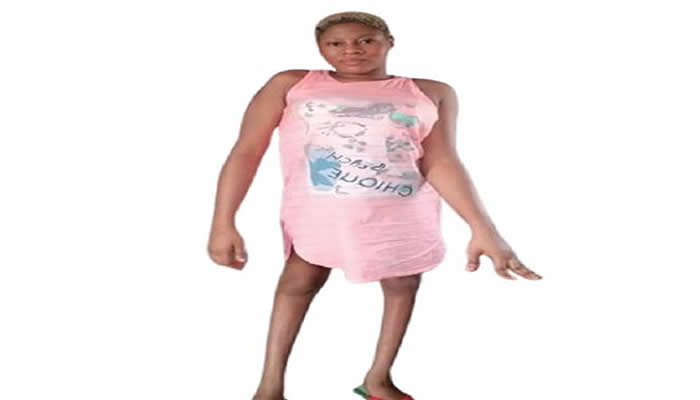
Twenty-seven-year-old physically challenged lady, Busayo Dairo, tells ABDULLATEEF FOWEWE how her best friend blocked every means of communication with her and how people bullied her because of her condition
What do you do for a living?
I’m Busayo Olaitan Dairo; I am 27 years old from Abeokuta, Ogun State. I just started an online business selling male wear, basically round-neck shirts.
Can you provide insights into your educational journey?
I began my educational journey in kindergarten. Fortunately, I secured a scholarship for my secondary education although it presented challenges due to my health issues. Despite the difficulties, I persevered with divine intervention. Subsequently, I enrolled at Moshood Abiola Polytechnic, Abeokuta. Unfortunately, my time there was cut short due to a severe illness during the second semester of the first year. This forced me to return home and spend two months recovering. I received nothing less than 20 injections, uncountable drips, and my eyes turned inside out; I nearly died during the period. It was during this period that I missed crucial academic activities, including exams and practical training (Student Industrial Work Experience Scheme). Despite attempts to catch up, I couldn’t pass my exams upon recovery. This led to my decision to drop out, fearing a recurrence of the illness if I continued.
You mentioned that you got a scholarship throughout your secondary school; how did you get it?
My mother is employed at the Lagos State University Teaching Hospital in Ikeja, which provides ample opportunities for various individuals, including HIV patients. It was through her connections that she secured the scholarship for me.
What illness prompted you to drop out of school?
I was diagnosed with typhoid fever, and it severely affected my body. I underwent numerous injections and received intravenous drips, and my condition deteriorated to the point where I was unable to walk. I was practically being carried everywhere. My mother constantly prayed and pleaded with me to avoid falling ill, as my illnesses were always severe. Despite this, I am not affected by sickle cell anaemia; instead, I have the AS genotype.
Did the condition of your leg result from the injections?
No! According to my mother, my leg was not always like this. I was walking normally, and I even celebrated my first birthday without any issues. However, about three months after my first birthday, my mother stopped breastfeeding me. I became inconsolable and developed a fever, prompting her to take me to the hospital, where they conducted several tests on me and prescribed medication for my treatment. Months later, she noticed that whenever she placed me down, I would lose my balance and fall. Initially, she believed that it was due to my weakness, but as the falls persisted, my mother took me to another hospital in Ikeja.
There, they informed her that my condition was critical and unsuitable for surgery. When vaccinations yielded no positive results, she decided to treat me spiritually. She revealed that I had come very close to death, but with divine intervention and persistent efforts, I managed to stand and walk again after two or more years. She also mentioned crafting walking sticks for me, which I rejected as I insisted on walking unaided. Today, I am grateful to God for everything. However, I am not certain about the cause of my condition as I was an infant at the time, and my mother was not given any specific information about it. If she knew, she would have informed me.
Do you think it runs in the family genetically?
No, not at all. None of my relatives has this condition, and there has never been a record of anyone in our family history who walks like me. Even on my father’s side, which I recently became acquainted with, everyone is perfectly healthy.
How did your father contribute to your recovery process?
I only got to know my father two years ago; he was not present during my recovery. It was my mother and siblings who were there for me. However, I prefer not to comment on my father at the moment as it is a personal matter.
What challenges have you faced as a result of your condition?
I have experienced neglect from friends, endured various forms of abuse, and received hurtful comments from ill-mannered individuals. Additionally, I have faced heartbreak in relationships. Sometimes, people view me as worthless just by merely looking at me.
What has been the most challenging aspect of coping with your condition?
The most challenging aspect for me has been maintaining relationships, particularly with men. It’s been incredibly tough as they tend to distance themselves once they learn about my physical challenges. I have lost many boyfriends due to my condition.
Have you experienced any instances of humiliation or discrimination due to your condition?
Not directly, but I often notice people staring at me whenever I’m out in public. Honestly, I do not experience much, except from my friends. Also, there are occasions when I can’t join my siblings in certain activities, but it’s never in a negative manner.
Have you ever struggled with depression?
Yes, I have, and it’s an ongoing battle. When I feel down, I usually turn to my phone for solace, either by listening to music or browsing social media, as music has always been a source of comfort for me.
Do you receive support from your friends?
Not really. I’ve distanced myself from most of my friends, and even the one I trusted turned out to betray me in the end.
Can you share positive experiences or unexpected blessings that have come from dealing with this challenging situation?
The positive experience I’ve had amidst these challenges is the warmth and acceptance I receive from people wherever I go. Additionally, an unexpected blessing I’m currently experiencing is gaining popularity on TikTok. Although I’m not yet a celebrity on the platform, I’ve started trending, which is something I’ve been praying for, for a long time. I’m truly grateful to God for the opportunity.
Do you have any specific goals or achievements you’re striving for?
I’ve made a personal vow to achieve greatness in life and to provide for my mother. With God’s grace, I believe that all my aspirations will come to fruition.
How has your journey influenced your perspective on life and shaped your priorities?
It has deepened my self-love and instilled in me the belief that challenges are temporary and everything will eventually work out for the best.
Have you lost any friendships due to your condition?
Certainly! My condition has led to the end of many relationships and has hindered me from moving on to new ones. Unfortunately, most of my friends only view my status updates and have distanced themselves from me. The friend I trusted the most, who was aware of my condition and struggles, blocked me on all social media platforms after I entrusted her with some money. Despite my attempts to reach out, she remained inaccessible. Eventually, she returned only a portion of the money after multiple attempts.
Furthermore, friends I’ve known since secondary school have also abandoned me, perhaps because I don’t frequently visit or socialise with them. Despite their financial stability, I’ve been unlucky in finding supportive friends who positively influence my life.
Are you open to the idea of returning to school?
To be frank with you, I have little desire to go back to school; even if I do decide to return, it will be through an online programme. Right now, my main focus is on making money. I know that some people have achieved success without formal education, but I don’t want to use that as an excuse. I simply want to work hard and achieve financial stability in life.
What are you most appreciative of?
I am most thankful for my life and the family that God has blessed me with, particularly my mother and older sister. They are both incredibly intelligent. During my time in secondary school, I didn’t face many challenges, except for feeling isolated from my classmates. I always stayed in the classroom, even during break times.
In what ways do you believe Nigerians can assist you?
I believe Nigerians can lend their support to me mentally, physically, and financially. Additionally, it would be meaningful if Nigerians treated individuals with physical disabilities in the same manner as everyone else, or even better. Furthermore, I am advocating for Nigerians to support employment opportunities for individuals like me, as well as to increase awareness and provide education about disabilities through fundraising efforts.
What advice would you give to others facing similar challenges?
I would advise them to focus on their abilities, not allowing their disabilities to define them, and to seek help when needed. It’s crucial to remember that suicide is never a solution.
What challenges did you encounter in your childhood?
In my childhood, I faced bullying from peers, but my mother encouraged me to stand up for myself. Additionally, my family resided in a church for 12 years; so most of my childhood was spent within that environment, which impacted my overall experience.
Has your condition prevented you from achieving any childhood dreams or aspirations?
Not at all! It sparked new interests and ambitions I never imagined pursuing. Moreover, my siblings provided me with invaluable support emotionally, physically, and financially, making a significant difference in my life.
Have you ever reached a point where you felt hopeless and considered suicide?
I’ve never entertained such thoughts because I believe in my beauty and the possibility of finding assistance. Additionally, the unwavering support of my close-knit family keeps me grounded and hopeful.
Have you acquired any new skills?
Yes, I briefly learned makeup application, although I had to discontinue due to the strain it placed on me.
What motivated you to pursue the business you’re involved in?
I decided to venture into the fashion industry because it’s currently a thriving sector globally. While I’m just starting and haven’t attracted many customers yet, I’m hopeful that I’ll find success in this field.
What are your aspirations for the future?
My aspirations include becoming a successful wife, mother, and a source of pride to my parents.
How have your challenges contributed to your personal growth?
Despite facing challenges, I’ve realised that many people facing similar or even greater obstacles have achieved success. This realisation has strengthened my resolve, and I acknowledge that I have no excuse not to strive for success.
Would you like to share a moment when you triumphed over a significant obstacle?
I’ve never faced any major obstacles, except for when my family left the church we lived in for 12 years. Since then, we moved to a rented apartment, and although my elder sister travelled to Dubai, we’ve been doing well ever since.
Would you consider entering into a relationship with a disabled man who is interested in marrying you?
No, I wouldn’t. As someone with a disability myself, I aspire to be a living example that despite my condition, I can marry an able-bodied man. Moreover, I believe it could potentially be traumatic for our future children. While I don’t deny the possibility, I am aware of the challenges I face due to my disability and wish to spare my children from similar experiences.
What misconceptions do you believe some Nigerians hold about individuals living with disabilities?
Many Nigerians doubt the potential for success among individuals with disabilities, which I find disheartening. I am determined to prove such misconceptions wrong.
What serves as your greatest source of motivation in life?
The Bible passage, ‘I can do all things through the Lord who strengthens me’, serves as my greatest source of motivation.
What lessons do you believe others in similar circumstances can learn from your experience?
I encourage them not to lose hope and to embrace their identities without hiding from the world.
Do you feel that the government has adequately supported individuals living with disabilities?
No, I don’t think so, as I still observe some individuals with disabilities begging on the streets, which is unacceptable in a country with a functioning government.
How has your condition influenced your relationships within your community?
My condition hasn’t negatively affected my relationships within my community. I know my boundaries and maintain positive interactions with others. I remain optimistic about improving my circumstances in the future, as I believe that when there is life, there is hope, and I am determined not to give up until I achieve my goals.





